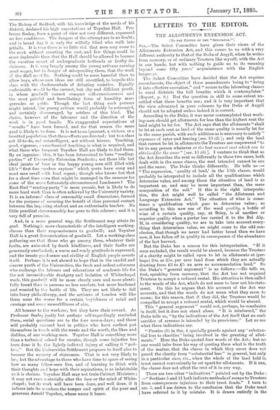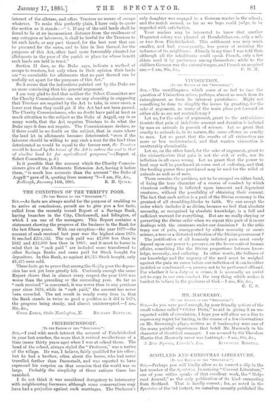LETTERS TO THE EDITOR.
THE ALLOTMENTS EXTENSION ACT.
pro THE EDITOR OF THE "SPECTATOE."1 SIR,—The Select Committee have given their views of the
Allotments Extension Act, and this comes to us with a very different authority to that of the Duke of Argyll, when he writes from memory, or of ordinary Trustees like myself, with the Act in our bands, but with nothing to guide us to its meaning beyond some fifty years' acquaintance with the English language.
The Select Committee have decided that the Act requires amendments, the object of these amendments being to " bring it into effective operation," and " secure to the labouring classes in rural districts the full benefits which it contemplates." (Report, p. 8.) But the question is still to some extent unsettled what these benefits are; and it is very important that the view advocated in your columns by the Duke of Argyll should not be adopted unless indeed it is correct.
According to the Duke, it was never contemplated that work
ing-men should get allotments for less than the highest rent the land might be let for. The Act says that the allotments " shall be let at such rent as land of the same quality is usually let for in the same parish, with such addition as is necessary to satisfy " expenses of rates and fencing [sec. 13 (2) ]; and only the land that cannot be let in allotments the Trustees are empowered " to let to any person whatever at the best annual rent which can be obtained for the same" [sec. 13 (6)]. I venture to think that as the Act describes the rent so differently in these two cases, both dealt with in the same clause, the rent intended cannot be one and the same. The Duke thinks differently. He tells us :— " The expression, ' quality of land,' in the 13th clause, would probably be interpreted to include all the qualifications which determine value, and among those the situation of land is as important as, and may be more important than, the mere composition of the soil." If this is the right interpretation, the Act might well be called " the Allotment and Language Extension Act." The situation of wine is sometimes a qualification which goes to determine value ; so according to this new use of the word quality, a bottle of wine of a certain quality, say, at Briey, is of another or superior quality when a porter has carried it to the Bel Alp. If, in considering quality, we are to take into account everything that determines value, we might come to the odd conclusion, that though we never had better bread than we have now, it has fallen off in quality in consequence of the abundance of the last harvest.
But the Duke has a reason for this interpretation. "If it were excluded, the result would be absurd, because the Trustees of a charity might be called upon to let in allotments at (perhaps) 20s. or 25s. per acre land from which they are actually drawing from £3 to £5 an acre as accommodation land." So the Duke's "general argument" is as follows :—He tells us, first, speaking from memory, that the Act has not required Trustees to accept a reduced rental. His attention is then called to the words of the Act, which do not seem to bear out his statement. On this he argues that his account of the Act was accurate, and that the words do not mean what they seem to mean ; for this reason, that if they did, the Trustees would be compelled to accept a reduced rental, which would be absurd.
This " general argument " would not, perhaps, be conclusive in itself, but it does not stand alone. " It is reinforced," the Duke tells us, "by the indications of the Act itself that no such sacrifice of revenue is intended by its provisions." Let us see what these indications are.
" Proviso (b) in Sec. 4 specially guards against any substan
tial loss to charities' being involved in the granting of allotments." Here the Duke quoted four words of the Act ; but no one would infer from his way of quoting them what is the truth of the matter, that the clause in which they occur does not guard the charity from "substantial loss" in general, but only in a particular case, viz., when the whole of the land held in trust cannot conveniently be set apart for allotments. If it can, the clause does not affect the rent of it in any way.
There are two other "indications " pointed out by the Duke : —" Sections 5 and 11 both indicate methods of escape to Trustees from consequences injurious to their trust funds." I turn to sec. 5, and I am driven to the conclusion that the Duke must have referred to it by mistake. It is drawn entirely in the interest of the allotees, and offers Trustees no means of escape whatever. To make this perfectly plain, I have only to quote the section as it stands :—" 5. If any of the said lands shall be found to lie at an inconvenient distance from the residences of any cottagers or labourers, it shall be lawful for the Trustees to let such lands, or any part thereof, for the best rent that can be procured for the same, and to hire in lieu thereof, for the purposes of this Act, other land more favourably situated for allotments to the poor of the parish or place for whose benefit such lands are held in trust."
Section 11 does, as the Duke says, indicate a method of escape to trustees, but cnly when in their opinion their lands are "so unsuitable for allotments that no part thereof can be usefully set apart for the purposes of this Act."
So it seems that the indications pointed out by the Duke are no more convincing than his general argument.
I am very glad to find that neither the Select Committee nor the Charity Commissioners can see any absurdity in supposing that Trustees are required by the Act to take, in some cases, a lower rent than they could get if the Act had not been passed. The Charity Commissioners, who no doubt have paid at least as much attention to the subject as the Duke of Argyll, say in so many words, that the Act requires Trustees to do what the Duke says it does not require. The Commissioners declare, as if there could be no doubt on the subject, that in cases where the land let in allotments becomes deteriorated, "even if the labourer should be willing to pay such a rent for the land thus deteriorated as would be equal to the former rent, the Trustees would be bound by the toms of the Act to reduce the rent to that of similar land let for agricultural purposes."—(Report of select Committee, p. 6.)
Is it possible that the account which the Charity Commissioners give of the Allotments Extension Act, having it before them, "is much less accurate than the account" the Duke of Argyll "gave of it, quoting from memory "P—I am, Sir, &c.,
Sedbergh, January 14th, 1885. R. H. QUICK.



































 Previous page
Previous page